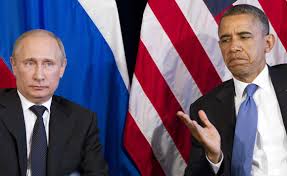 For more on the strained relationship between Russia and the U.S., we're joined by Steven Pifer. He's former ambassador to Ukraine, and a Senior Fellow at the Brookings Institution. Ambassador, welcome.
For more on the strained relationship between Russia and the U.S., we're joined by Steven Pifer. He's former ambassador to Ukraine, and a Senior Fellow at the Brookings Institution. Ambassador, welcome.
STEVEN PIFER: Glad to be here.
HEADLEE: The President spoke yesterday and he referred to this tension in the relationship between himself and President Putin. There seem to have been a momentum in the relationship between the U.S. and Russia during Obama's first term in office. That's when we were talking about a reset, remember? What happened?
PIFER: Well, during those first two years, 2009 and 2010, the sides actually got a lot done. They got the new START treaty done that reduces U.S. and Russian strategic nuclear forces. They had cooperation on Iran. Russia did something that, you know, when I was in the U.S. government we would not have imagined possible, that Russians agreed to an arms embargo on Iran. And Russia was very helpful in terms of providing logistics routes to Afghanistan.
The relationship drifted a bit in 2011 and 2012 in part because there were presidential campaigns going on in both countries. And unfortunately, when Mr. Putin came back he seems to have brought a fairly strong anti-American tone with him, and that's not been helpful to the relationship.
HEADLEE: Although it may be politically expedient for him in Russia?
PIFER: It may be politically expedient in Russia where this thing seems to play very well. But it has also created a certain amount of irritation in Washington, and that combined with what was really, I think, the major reason why the White House announced cancellation of the summit in Moscow, was that on the big issues they were looking at - further reductions in nuclear weapons, an agreement on missile defense differences, an agreement on expanding economic and commercial relations, they just saw no movement from the Russian side. And it created the prospect that the summit would not be very successful in terms of outcomes.
HEADLEE: There've been a lot of debate and comments about what this strain in the relationship may mean, especially the most recent cancellation of the summit and Edwards Snowden taking refuge in Russia. But you wrote a piece in The Moscow Times in which you called Putin irrelevant to Obama. What do you mean?
PIFER: Well, I think the dynamic has changed a lot since 2009 when the Obama administration saw a real need for better relations with Russia to achieve its goals in Iran, Afghanistan on nuclear nonproliferation. But today, on Iran, nobody in Washington anticipates that Russia will be prepared to crank up additional pressure on Tehran. And likewise on Afghanistan, in 2014, the American and NATO troop presence there is going to be much smaller than it is today.
So those logistic routes, while useful, will not bear it nearly as essential. And moreover, if Afghanistan fails badly it's as big a problem for Russia as is for the United States. So the one thing I think that the president would like to get from Putin is movement on further cuts in nuclear weapons. But if President Putin is not prepared to engage seriously on that, there's a chance the White House may conclude that Putin really is not relevant for Obama's agenda in his next three years.
HEADLEE: Well, how willing is Russia to deal, I mean, after all Secretary John Kerry and then Chuck Hagel did, in fact, meet with their Russian counterparts? They talked about Syria and Edwards Snowden. Maybe some of these deals are being made behind the scenes.
PIFER: Well, we'll see. I mean, I think it was good that the discussion happened yesterday between the secretary of defense and the secretary of state and their Russian counterparts. And it shows that, although the summit was canceled, engagement between Washington and Moscow is continuing. But we're still going to have two wait and see if there is the possibility of progress on some of these big questions that the president would like to move on.
HEADLEE: Steven Pifer, former Ambassador to Ukraine and a senior fellow at the Brookings Institution, thank you so much.
By KGOU
The Iran Project is not responsible for the content of quoted articles.

 QR code
QR code